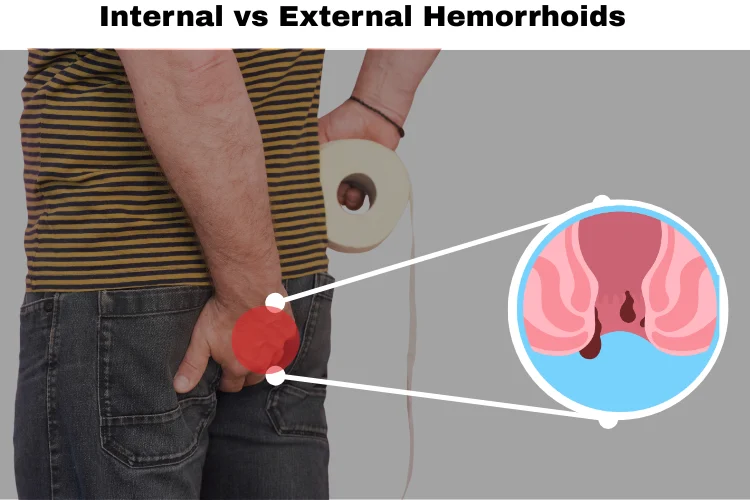Introduction
Piles or hemorrhoids are inflamed veins in the lower rectum and anus. Early piles usually heal with basic treatments at home, but more progressed stages — Stage 3 and Stage 4 — can be very painful and may need surgical treatment. Learning the symptoms and when to look for help is important to your health and well-being. Let us investigate what piles Stage 3 and 4 entail and when one should see a doctor for surgery.
What Are Piles Stage 3 and 4 ?
Stage 3 Piles:
At this stage, the hemorrhoids prolapse (come out) during bowel movements but can be pushed back manually into the anus. Symptoms like bleeding, pain, and swelling are common.
Stage 4 Piles:
This is the most severe stage. Hemorrhoids are permanently prolapsed and cannot be pushed back inside. They may cause intense pain, continuous bleeding, and increase the risk of complications like strangulation (when the blood supply is cut off).
Understand the 4 Grades of Piles
Symptoms of Piles Stage 3 and 4
Recognizing the symptoms early can prevent further complications. Common symptoms include:
- Persistent pain or discomfort
- Bleeding during or after bowel movements
- Itching and irritation around the anus
- Swelling and hard lumps around the anus
- Mucus discharge
- Difficulty cleaning the area after bowel movements
If you notice any of these symptoms worsening, it’s a sign you should consult a specialist.
When to Consult a Doctor for Surgery
Not every case of piles requires surgery, but Piles Stage 3 and 4 often do. Here’s when you should definitely consult a doctor:
Persistent Pain:
If the pain does not get better with medications or changes in life, it might be a sign of advanced piles that require surgery.
Frequent Bleeding:
On-going or heavy bleeding is an alarm sign and requires prompt assessment.
Prolapse That Can’t Be Managed:
When hemorrhoids are always out of the anus and can’t be replaced, surgery is most often the treatment of choice.
Failed Non-Surgical Treatments:
If creams, suppositories, sitz baths, and dietary changes provide little or no relief, the next step could be surgical.
Symptoms of Complications
Severe pain, swelling, or infection (e.g., fever, redness, pus) need immediate medical evaluation.
Surgical Options for Piles Stage 3 and 4
Depending on your condition, your doctor might suggest different surgical treatments:
Hemorrhoidectomy:
This is the surgical removal of hemorrhoids and is commonly advised for prolapsing Stage 3 or Stage 4 piles.
Stapled Hemorrhoidopexy
A less painful option in which a special stapling device is employed to relocate the hemorrhoids and shut off their blood supply.
Laser Surgery:
A minimally invasive procedure that employs laser energy to shrink or eliminate hemorrhoids with shorter recovery time.
Why Early Consultation Matters
The more prolonged the time severe piles remain untreated, the higher the chances of developing complications such as strangulated hemorrhoids, infection, and chronic pain. Early visitation guarantees that you receive the appropriate treatment before the issue aggravates, and it increases your chances of recovery at a faster rate with minimal complications.
Conclusion
Piles stage 3 and 4 are serious, often painful conditions that usually need surgical treatment for long-term relief. If you have ongoing bleeding, prolapse, or bad pain, don’t hesitate — see an experienced doctor to discuss your options. Early action can eliminate unnecessary discomfort and enable you to live a healthy, comfortable life once more.
If you think you have advanced piles, book an appointment with a specialist today. Early detection and treatment can make all the difference in your healing process.
FAQs
1. What are Stage 3 and Stage 4 piles?
Stage 3 piles are prolapsed hemorrhoids that can be pushed back with the hand. Stage 4 piles are fixed prolapsed hemorrhoids and cannot be pushed in, and are very painful as well as produce other complications.
2. What are the symptoms of Piles Stage 3 and 4 ?
Some symptoms are recurring pain, pain or bleeding on defecation, swelling around anus, itching and prolapse not reducible.
3. When do I need to see a doctor for surgery?
See a doctor if you have ongoing pain, recurrent bleeding, prolapse that cannot be controlled, or complications like infections. Surgery can be required for piles Stage 3 and 4.
4. What are the surgical procedures for Stage 3 and Stage 4 piles?
Surgical procedures are hemorrhoidectomy (excision of hemorrhoids), stapled hemorrhoidopexy (stapling and repositioning), and laser surgery.
5. Can piles heal without surgery?
Piles in the early stage can change with lifestyle modifications and without surgery. Stage 3 and Stage 4 piles, however, usually need surgical removal for permanent relief.




